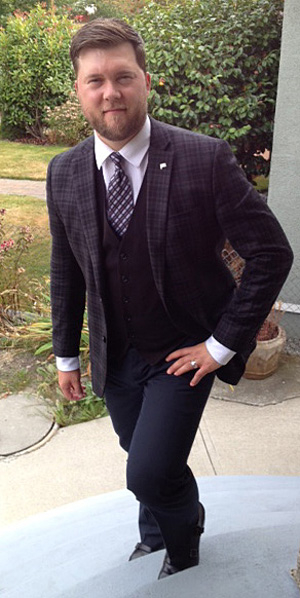The highest concentration of social enterprises in B.C. and potentially in Canada is in Vancouver’s Downtown Eastside (DTES), says Wes Regan, executive director of the Hastings Crossing Business Improvement Area (HxBIA). HxBIA serves 650 businesses in a central portion of the DTES with community resilience, inclusivity and local economic sustainability in mind.
“That’s a really exciting trend, to see the social economy take up more of the discussion when we talk about what the local economy and revitalization look like.”
“I think that when people read newspaper articles about what’s going on in the DTES, they’re not given a very complete picture of what goes on on a day-to-day basis,” Wes says. “The good news stories take a back seat to the conflict stories or the sensationalized stories about gentrification and protests.”
|
Image

|
|
| Wes Regan |
What Wes sees more often are many examples of collaboration and connection between businesses and residents.
BLENZ COFFEE, a Canadian coffee chain with more than 60 locations across B.C., was viewed with skepticism by some when it first opened a location in the area a few years ago. “Oh great, the chains are moving in,” Wes recalls some people saying. But the location has become recognized as one of the safest and inclusive business environments for DTES residents.
“No one came and told them they had to do that. They just had the right mindset about it. They’re a great example of a business that people were wary of in the beginning, and then they proved everyone wrong and became an important social gathering space for residents nearby,” Wes explains.
He will moderate an open community panel discussion on Sept. 24 at Portside Pub, featuring a range of nonprofits and social enterprises in the area in discussing best practices and trends around social-impact hiring.
“All types of businesses (not just social enterprises) are showing more interest in understanding their social impact,” Wes says. “There are a range of resources in the DTES to help businesses who want to become social impact employers or want to learn how to become more socially inclusive.”
These resources include Recipes for Success Services — subsidized consulting from the team at Potluck Café, who have learned how to effectively hire and retain residents with barriers to employment over the last 10 years; and EMBERS Staffing Solutions, a community economic development charity in the area providing employers with temporary staff as a means of transitioning local residents into full-time work.
For businesses that aren’t culturally accessible to residents with barriers, Wes suggests there are a number of ways for businesses to give back to the community. The Aprons for Gloves fundraiser, for example, presents an opportunity for local businesses to participate in boxing matches, which have raised hundreds of thousands of dollars for DTES-focused charities over the last year.
This week Building Opportunities with Business will announce a new fund called V-Prize it developed with Wes and local business Olla Urban Flower Project. Wes carefully researched the social finance landscape in Vancouver, looking for a gap to apply the fund into for the greatest impact. In partnership with EMBERS’ Grow a Business Program, V-Prize aims to help young, established businesses looking to grow but running into barriers when trying to access traditional capital. Businesses must also commit to hiring DTES residents, including residents with barriers.
“I think we’re at a point in North America where our institutions are no longer operating in such a way that they’re enabling our population to flourish, and we’re seeing an erosion of trust in institutions. I think we’re seeing a need for new institutions to be formed, and that’s never an easy process,” Wes says.
“Taking a BIA as an example, you’re taking something that for the last 40 years or so has existed to do primarily a set of improvement schemes, like public infrastructure, place-making and branding. We’ve seen BIAs around the world evolve to the point where now we can get away with something truly innovative: let’s start a BIA that has social innovation and inclusion right at the core of its mandate.”
HxBIA is developing a social inclusion strategy and a good neighbours charter with local residents to better understand how to manifest a local economy that is truly inclusive and reflective of their needs. The BIA is reaching out to a group of potential collaborating partners, including Carnegie Community Centre and the Downtown Eastside Neighbourhood Council, who has already committed to the collaboration.
For more information on the DTES Social Impact Hiring Panel, visit: supportive-business-practice-esli.eventbrite.com
More information on V-Prize will be available this week at: www.hxbia.com
A version of this article was originally written for the Urban Systems news service. To learn more about generative newsroom options for your organization or community, please contact peter(at)axiomnews.ca.





